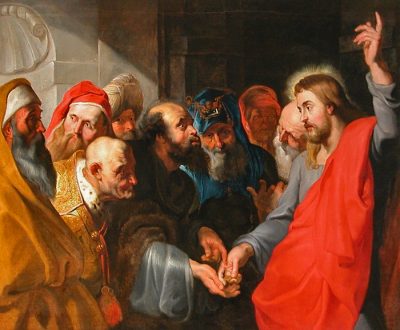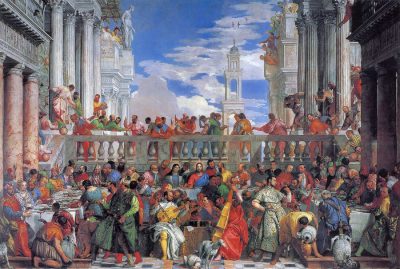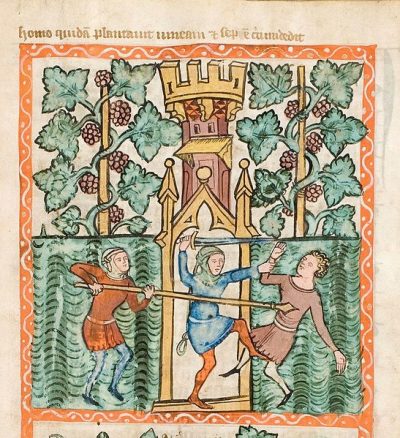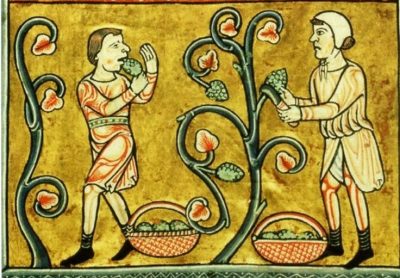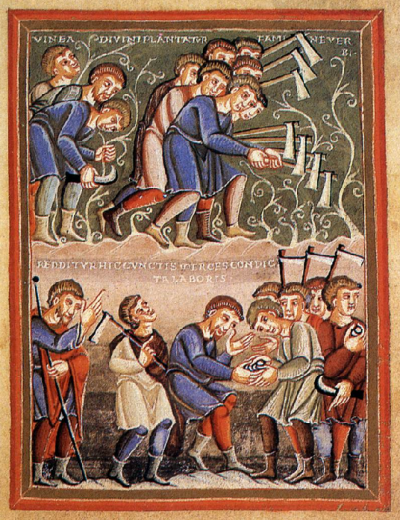Sunday Bible Reflections
This Sunday
The Anointing: Scott Hahn Reflects on the Feast of the Baptism of the Lord
The Liturgy last week revealed the mystery of God’s plan—that in Jesus all peoples, symbolized by the Magi, have been made “coheirs” to the blessings promised to Israel. This week, we’re shown how we claim our inheritance.
Jesus doesn’t submit to John’s baptism as a sinner in need of purification. He humbles Himself to pass through Jordan’s waters in order to lead a new “exodus”—opening up the promised land of heaven so that all peoples can hear the words pronounced over Jesus today, words once reserved only for Israel and its king: that each of us is a beloved son or daughter of God (see Genesis 22:2; Exodus 4:22; Psalm 2:7).
Caesar and the King: Scott Hahn Reflects on the Twenty-Ninth Sunday in Ordinary Time
The Lord is king over all the earth, as we sing in today’s Psalm. Governments rise and fall by His permission, with no authority but that given from above (see John 19:11; Romans 13:1).
In effect, God says to every ruler what He tells King Cyrus in today’s First Reading: “I have called you . . . though you knew me not.”
The Lord raised up Cyrus to restore the Israelites from exile, and to rebuild Jerusalem (see Ezra 1:1–4). Throughout salvation history, God has used foreign rulers for the sake of His chosen people. Pharaoh’s heart was hardened to reveal God’s power (see Romans 9:17). Invading armies were used to punish Israel’s sins (see 2 Maccabees 6:7–16).
Dressing for the Feast: Scott Hahn Reflects on the Twenty-Eighth Sunday in Ordinary Time
Our Lord’s parable in today’s Gospel is again a fairly straightforward outline of salvation history.
God is the king (see Matthew 5:35), Jesus the bridegroom (see Matthew 9:15), the feast is the salvation and eternal life that Isaiah prophesies in today’s First Reading. The Israelites are those first invited to the feast by God’s servants, the prophets (see Isaiah 7:25). For refusing repeated invitations and even killing His prophets, Israel has been punished, its city conquered by foreign armies.
Living on the Vine: Scott Hahn Reflects on the Twenty-Seventh Sunday in Ordinary Time
In today’s Gospel Jesus returns to the Old Testament symbol of the vineyard to teach about Israel, the Church, and the kingdom of God.
And the symbolism of today’s First Reading and Psalm is readily understood.
God is the owner and the house of Israel is the vineyard. A cherished vine, Israel was plucked from Egypt and transplanted in a fertile land specially spaded and prepared by God, hedged about by the city walls of Jerusalem, watched over by the towering Temple.
The Humble Path: Scott Hahn Reflects on the Twenty-Sixth Sunday in Ordinary Time
Echoing the complaint heard in last week’s readings, today’s First Reading again presents protests that God isn’t fair. Why does He punish with death one who begins in virtue but falls into iniquity, while granting life to the wicked one who turns from sin?
This is the question that Jesus takes up in the parable in today’s Gospel.
First and Last: Scott Hahn Reflects on the Twenty-Fifth Sunday in Ordinary Time
The house of Israel is the vine of God, who planted and watered it, preparing the Israelites to bear fruits of righteousness (see Isaiah 5:7; 27:2–5).
Israel failed to yield good fruits and the Lord allowed His vineyard, Israel’s kingdom, to be overrun by conquerors (see Psalm 80:9–20). But God promised that one day He would replant His vineyard and its shoots would blossom to the ends of the earth (see Amos 9:15; Hosea 14:5–10).
The Debt We Owe: Scott Hahn Reflects on the Twenty-Fourth Sunday in Ordinary Time
Mercy and forgiveness should be at the heart of the Christian life.
Yet, as today’s First Reading wisely reminds us, often we cherish our wrath, nourish our anger, refuse mercy to those who have done us wrong. Jesus, too, strikes close to home in today’s Gospel with His realistic portrayal of the wicked servant who won’t forgive a fellow servant’s debt, even though his own slate has just been wiped clean by their master.
Sign up to receive Scott Hahn’s Weekly Sunday Bible Reflections
